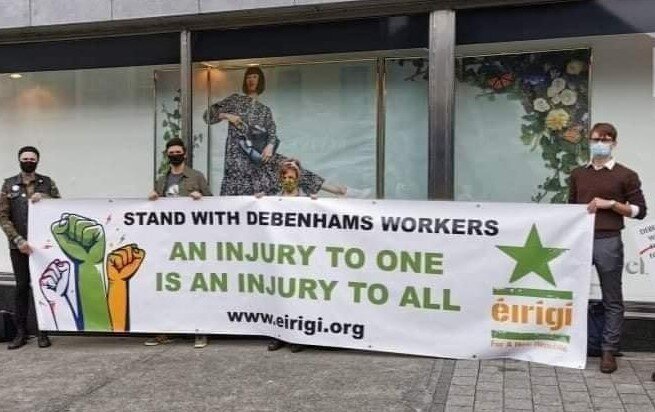Trade Unions Can Advance The Interests Of Public And Private Workers Alike
SIPTU and Forsa members in Local Employment Services and Jobs Clubs continued their campaign against the privatisation of community services by protesting outside the Fine Gael ‘think-in’ meeting in Trim, Co. Meath earlier today.
Their efforts are beginning to show results as a meeting with their funders and management has been secured. The threat of industrial action presumably helped to focus the employers minds.
Public sector unions have also recently secured pay increases for their members and rolled back some of the austerity cutbacks imposed on civil and public servants after the crash.
In the private sector trade union activity is also continuing to advance the cause of workers. A case in point being the Doyle Shipping Group in Dublin Port recently agreed to talks with SIPTU having been threatened with industrial action.
There is a long history of trade union struggle on Ireland, stretching back into the late 19th century. The legacy of the epic 1913 Lockout echoes down through the decades to modern times, as outlined by Cathaoirleach Brina Leeson in 2013 in the video below.
All improvements in the workplace have been achieved though working people organising together in trade unions. The weekend, as we know it, exists due to unions and workers winning the right to a five-day working week. Sick pay, holiday pay and equal pay for women all arose as a result of organised Trade Unions.
More recent workplace victories have included the introduction of the smoking ban and minimum wage legislation. None of these gains were granted from on high by the great and the good in positions of power. They came about due to long, difficult, sometimes bloody, but ultimately successful trade union campaigns.
Today there are still many battles to be won. The pay gap between men and women remains far too wide Insecure and precarious work - often referred to as the ‘gig economy - is on the rise. Also on the increase is the practice of forcing workers into bogus self-employment so that the employer is not liable for their PRSI and the whole range of leave and other entitlements that PAYE workers have.
Enforced bogus self-employment is rampant in the construction sector
Irish trade unions are also very active in trying to ensure a “just transition” for workers in the fossil fuel sector who will need to retrain to work in alternative, less damaging industries including the renewable energy sector.
It is the trade unions too that are pushing back against the anti-worker 1990 Industrial Relations Act and campaigning for the right to guaranteed union recognition in all workplaces.
For these, and many other workplace battles, organised labour remains the most powerful weapon that is available to public and private sector workers alike. Unions hold the key to mobilising vast numbers of people in public protest, industrial action and other forms of collective action.
Éirígí activists in Galway standing with the Debenhams workers
In the New Republic that we want to see established trade union recognition will be compulsory. Zero hour contracts, enforced bogus self-employment and other “gig economy” exploitative practices will be outlawed and the gender-pay-gap will be closed. Workers displaced by technological advances will be retrained as required.
Éirígi encourages all workers, both public and private, to join a trade union - to work within their union to build it and improve it. Building the unions in this way will be key necessary to move beyond 33% of workers are currently covered by collective agreements in their workplace.
Beyond the workplace, a strong radical trade union movement will be essential to building the New Republic that Ireland so badly needs.



